Russian internet company Yandex has been in the news recently, and not just because it’s one of the leading and most globally reaching technology firms in Russia. The company, founded as a search engine in 2000 and now worth billions of dollars, announced plans in November 2022 to potentially restructure the company—to possibly include taking one of its cloud, educational technology, data labeling, self-driving technology, or other divisions and operating it independently from the Russian Yandex.
This follows a years-long battle between Yandex and the Kremlin. In October 2019, the Russian government said it would restrict foreign entities’ investments in Russian technology companies—dropping Yandex’s shares by 17% and its worth by more than $1 billion in just minutes. Disputes ensued, and the following month, Yandex announced a new governance board that would give Russian government officials the power to veto deals and transactions, appoint board members, block the company from entering into agreements, and even suspend Yandex’s CEO. Since the Putin regime launched its illegal war on Ukraine in February 2022, tensions have increased. In August 2022, Yandex sold off its media assets to government-backed internet firm VK (formerly, VKontakte) after trying to distance itself from state propaganda.
Margin Research, as part of its work on the Defense Advanced Research Projects Agency (DARPA)’s SocialCyber effort, has been looking into Yandex, its open-source code base, and the contributors underpinning it. To do so, we ingested data from Yandex’s many GitHub repositories, ran SocialCyber artificial intelligence (AI) analysis on the data, and supplemented that automated analysis with manual analysis of the data and related open-source information. Disruptions to an organization often have cascading effects into code bases. By identifying these disruptions we can help organizations insulate themselves from risk in their dependent software.
We found that Yandex is heavily hiring in Russia, although it does have some ongoing hiring efforts in Armenia, Finland, Serbia, Kazakhstan, Israel, Switzerland, and elsewhere. The numerous contributors to Yandex’s open-source code bases also appear to be contributing the most from the UTC+03:00 time zone, which covers East Africa, part of Asia, part of Eastern Europe, and part of Russia. This suggests Yandex may have much work ahead of it, should it carry along with this business bifurcation plan, in either relocating some of its Russian talent to live outside of Russia or, more likely, hiring new people for its outside-of-Russia business who do not live in Russia.
The Global Talent Base for Yandex’s Open-Source Software
If Yandex identifies divisions and splits into an international version and a Russian version, it will also have to contend with staffing questions—that is, ensuring it has the requisite talent to keep developing and managing its products and services both in and outside of Russia. Before analyzing GitHub data that indicates where Yandex’s open-source software contributors are based, I gathered and visualized data on Yandex’s current office locations and publicly listed job vacancies.
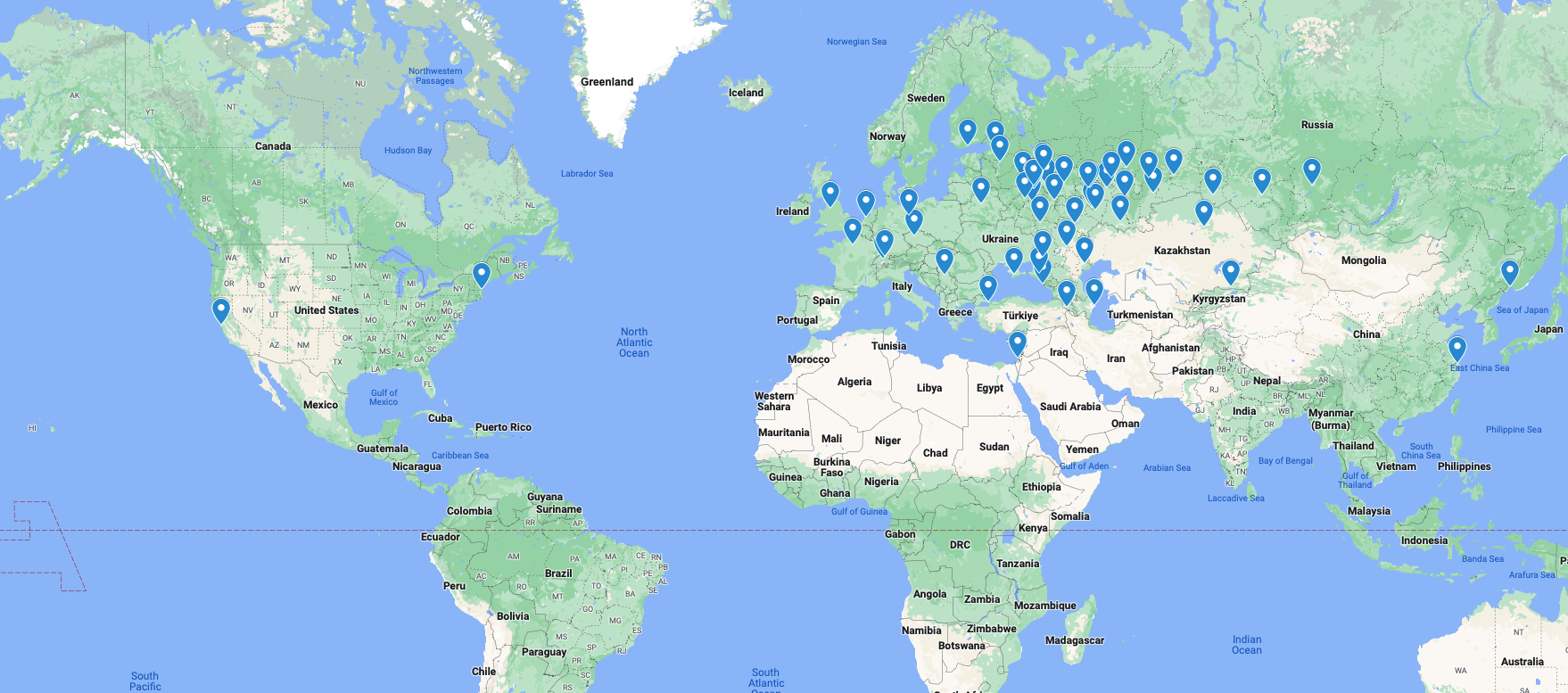
Yandex, as of mid-December 2022, has 60 offices around the world, spanning Russia, Serbia, Kazakhstan, Israel, Armenia, Belarus, the Czech Republic, the Netherlands, Finland, Switzerland, Azerbaijan, Germany, England, Turkey, France, Uzbekistan, the United States, China, and Taiwan. It has 39 offices in Russia, with its headquarters located in Moscow. It has two offices in the US, one in Newburyport, Massachusetts and one in Palo Alto, California. It also has an office in Shanghai, China as well as Taipei, Taiwan (which Yandex on its website placed under the “China” list of country offices).
As of mid-December 2022, Yandex was listing 88 job vacancies on the English-language version of its website, spanning Belarus, Russia, the Czech Republic, the Netherlands, Finland, Turkey, and Switzerland. It was simultaneously listing 1,109 job vacancies on the Russian-language version of its website, spanning Russia, Serbia, Armenia, Kazakhstan, Belarus, Israel, the Netherlands, and Uzbekistan.
Most vacancies, as highlighted in the charts below, were listed for jobs in Russia. On a methodological note, Yandex listed some jobs for multiple locations, ostensibly because the role could be filled by a person in one of multiple offices. Hence, in the below visualizations that break the vacancies down by country, some of the job vacancies may be counted multiple times (e.g., the new hire could be in Russia or Kazakhstan). Each of these vacancies still constitutes an additional Yandex job vacancy in the country in question.
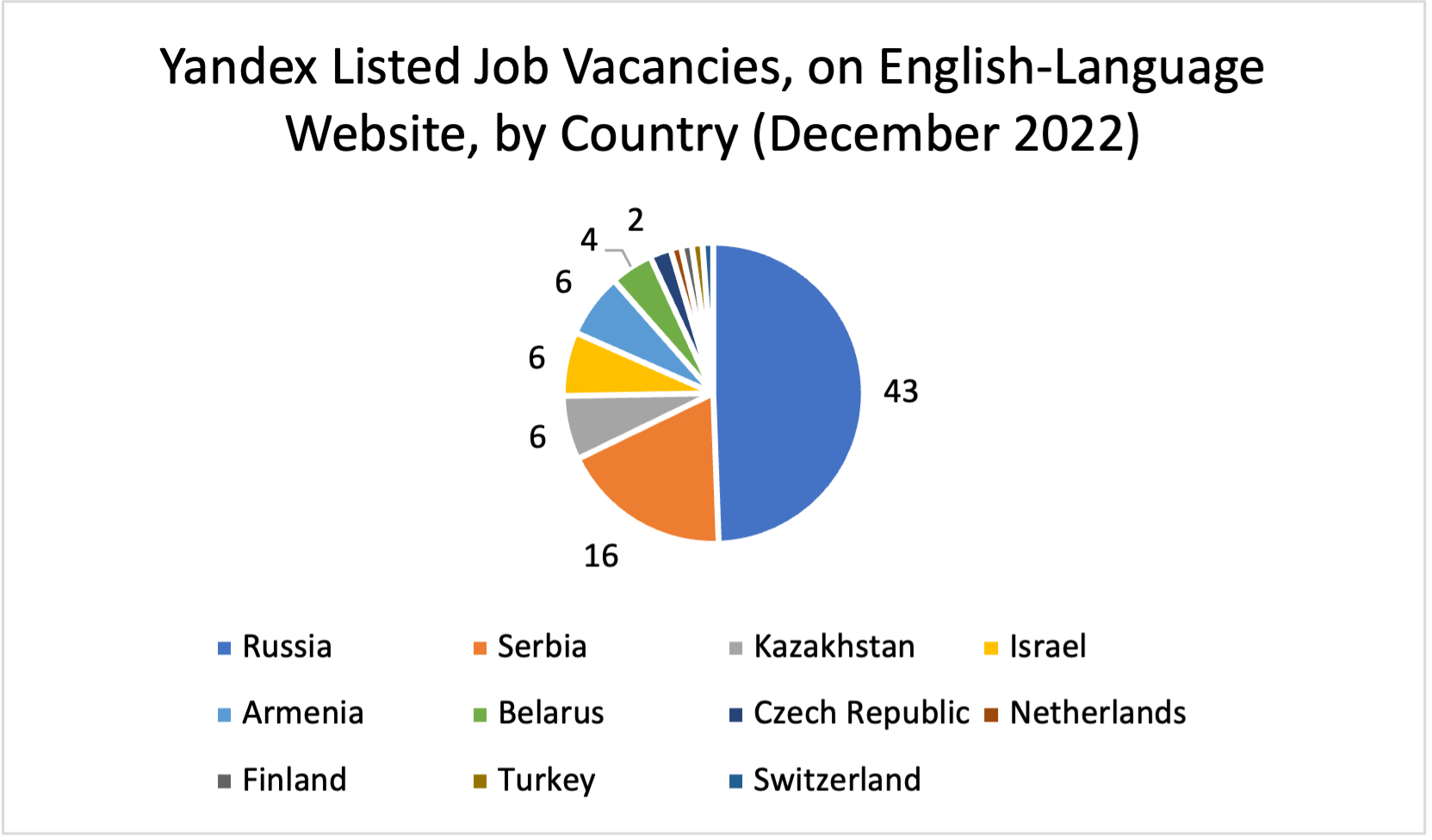
For job vacancies listed on the English-language Yandex website, approximately 50% were listed in Russia, followed by about 18% in Serbia and 7% each in Kazakhstan, Israel, and Armenia.
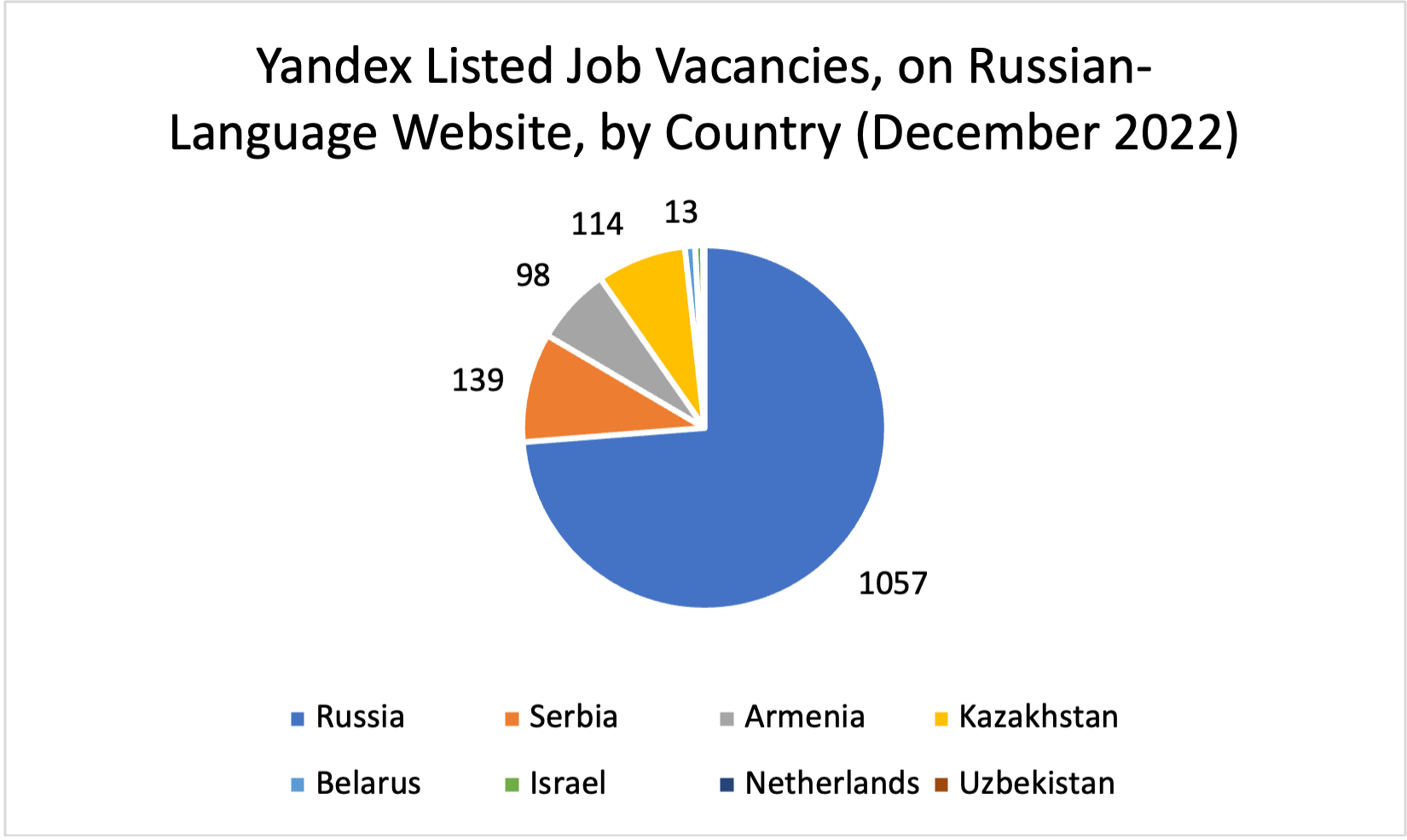
For job vacancies listed on the Russian-language Yandex website, a strong majority were listed in Russia (74%), followed by about 10% in Serbia, 8% in Kazakhstan, and 7% in Armenia. While the percentage of job vacancies listed in Russia is not surprising, it is notable that Serbia, Kazakhstan, and Armenia appear to be significant, current hiring destinations for Yandex.
Contributions to Yandex’s Open-Source Code Bases
We ingested data from 154 Yandex GitHub repositories—including from Yandex Cloud and Yandex proper—ran SocialCyber AI analysis on the data, and zoomed in specifically on the time zones from contributors. We found that most emails contributing to Yandex’s collection of GitHub repositories, over time, appear to be based in the UTC+03:00 time zone, which covers East Africa, part of Asia, part of Eastern Europe, and part of Russia (see below figure). The relevant time zone for each email contributor was identified based on the time zone from which that email contributed the most.
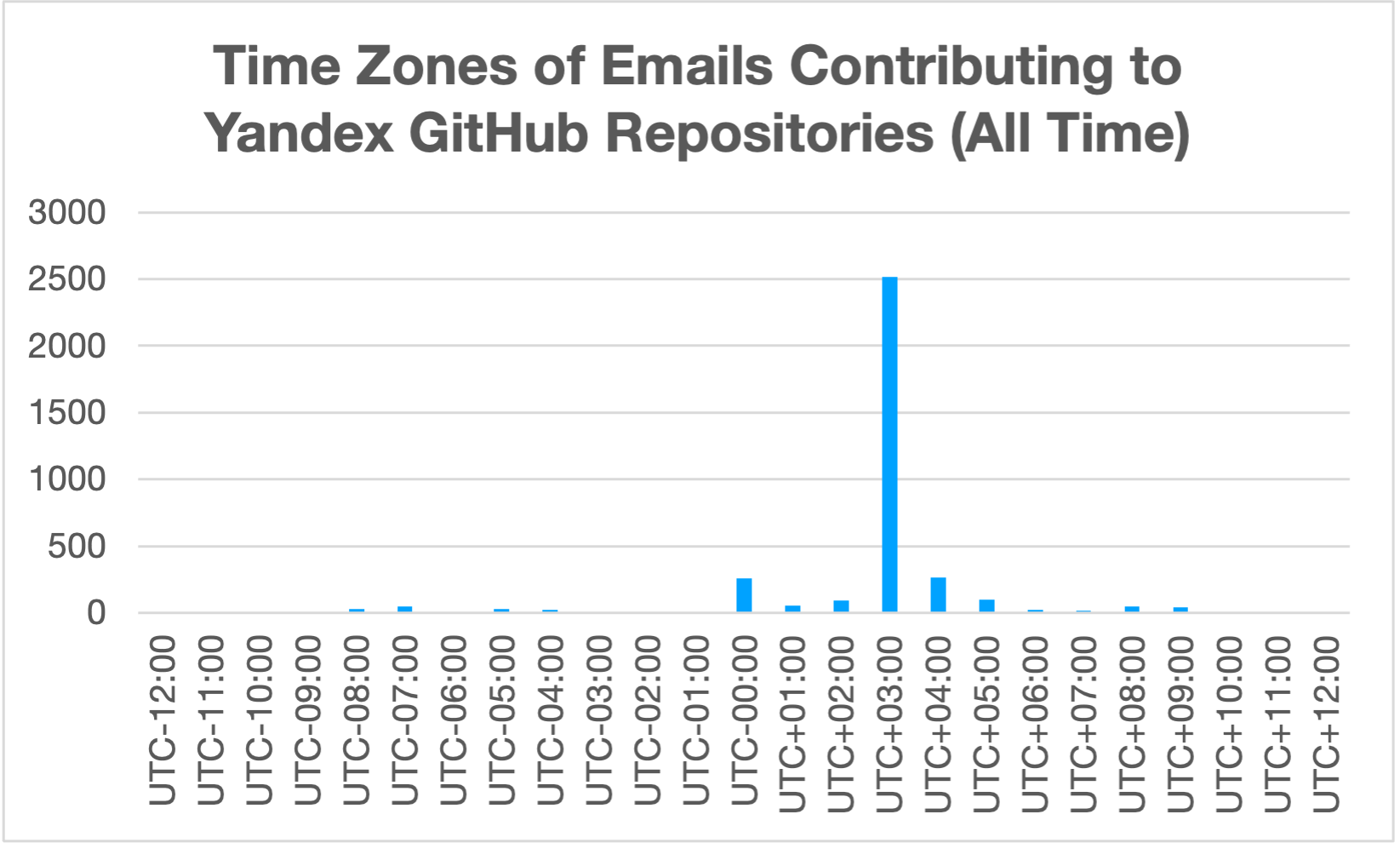
The majority of the emails contributing to Yandex’s GitHub repositories (over 2,500 of them) appeared to be doing so from the UTC+03:00 time zone, which encompasses East Africa (e.g., Comoros, Djibouti, Ethiopia, Kenya, Somalia), part of Antarctica, parts of Asia (e.g., Bahrain, Iraq, Jordan, Qatar, Saudi Arabia), part of Eastern Europe (e.g., Belarus, Turkey, Ukraine, the Abkhazia and South Ossetia regions), and part of Russia (including the Central Federal, Northwestern Federal, and Volga Federal districts). The graphic below captures the UTC time zone breakdowns.
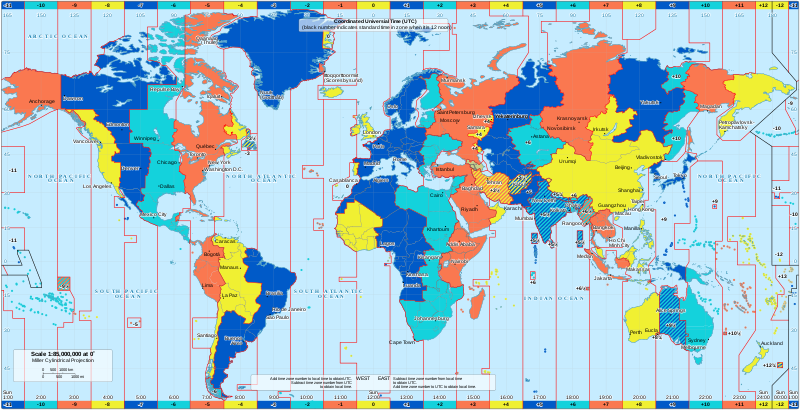
Yandex’s Uncertain Future
There are many open-ended questions about Yandex’s future, ranging from the Kremlin’s possible involvement in the company’s restructuring plans to the viability of its efforts to differentiate its activities outside Russia from its activities within the country. Yandex has tried to break away from the Kremlin’s grip before and failed, but perhaps this time will be different.
In this effort to separate out its business operations geographically, Yandex will have to ensure it has the necessary workforce to support a bifurcated business. Theoretically, Yandex could have its outside-of-Russia business leverage software developers in Russia, but that would likely undercut the very purpose of its bifurcation plan—as that could exacerbate potential customers’ worries about engaging with Russian businesses.
Based on this data, Yandex may face several challenges on the talent side of this planned business split. Both the contributions to its 100+ open-source code bases on GitHub and the job postings on its English- and Russian-language websites suggest that many of its software developers, and its hirees, are located in Russia. The following screenshot, taken from Yandex’s LinkedIn page in March 2023, further indicates that Yandex has its talent heavily concentrated in Russian borders.
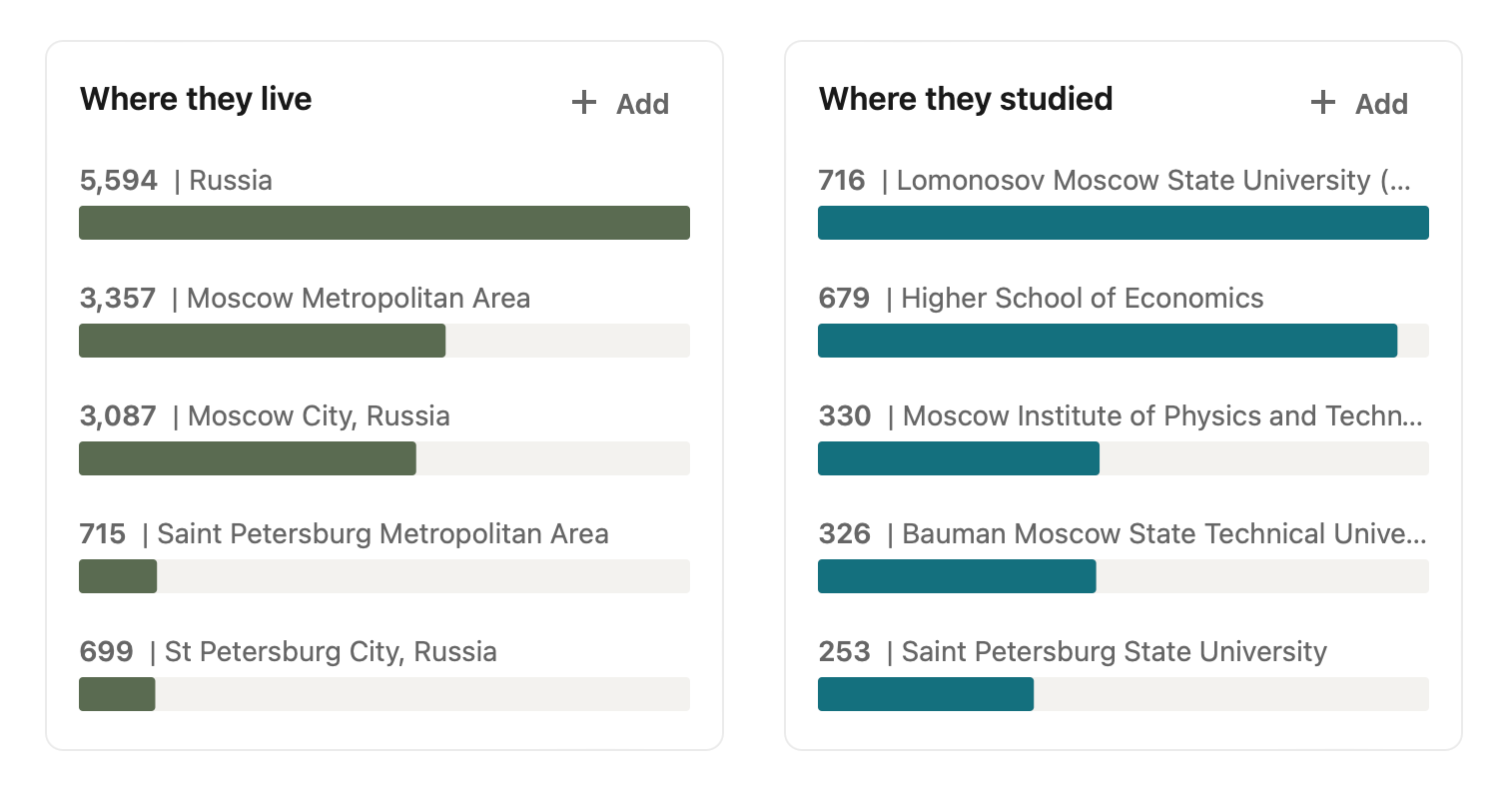
Hence, Yandex would have to do significant amounts of relocating or hiring of talent in order to staff its outside-of-Russia business with people who do not live in Russia.
The more that some Russian technology companies seek to expand outside of Russia—or to restructure or present themselves in ways that seek to address others’ concerns about security risks—the more they will have to contend with the challenge of drawing on global talent.
Glossary: Time Zones
The majority of the emails contributing to Yandex’s GitHub repositories (over 2,500 of them) appeared to be doing so from the UTC+03:00 time zone, which encompasses East Africa (e.g., Comoros, Djibouti, Ethiopia, Kenya, Somalia), part of Antarctica, parts of Asia (e.g., Bahrain, Iraq, Jordan, Qatar, Saudi Arabia), part of Eastern Europe (e.g., Belarus, Turkey, Ukraine, the Abkhazia and South Ossetia regions), and part of Russia (including the Central Federal, Northwestern Federal, and Volga Federal districts). After that, there were 263 emails that appeared to be contributing from UTC+04:00 and 259 emails that appeared to be contributing from UTC-00:00. The former time zone, UTC+04:00, encompasses part of Russia (e.g., part of the Southern Federal District and Volga Federal District), the Caucasus region (e.g., Armenia, Azerbaijan, Georgia), part of the Middle East (Oman and the UAE), and part of Africa (e.g., Mauritius, Seychelles). The latter time zone, UTC-00:00, encompasses part of Western Europe (e.g., Portugal, UK, Faroe Islands) and the Atlantic Islands (e.g., Canary Islands).
Other time zones of note include emails that appear to be contributing from, in decreasing order of volume, UTC+05:00 (including paper of South Asia, Central Asia, and part of Russia), UTC+02:00 (including Central Africa and part of Russia), UTC-07:00 (including part of North America), and UTC+08:00 (including part of Russia, part of East Asia, Southeast Asia, and part of Australia).
